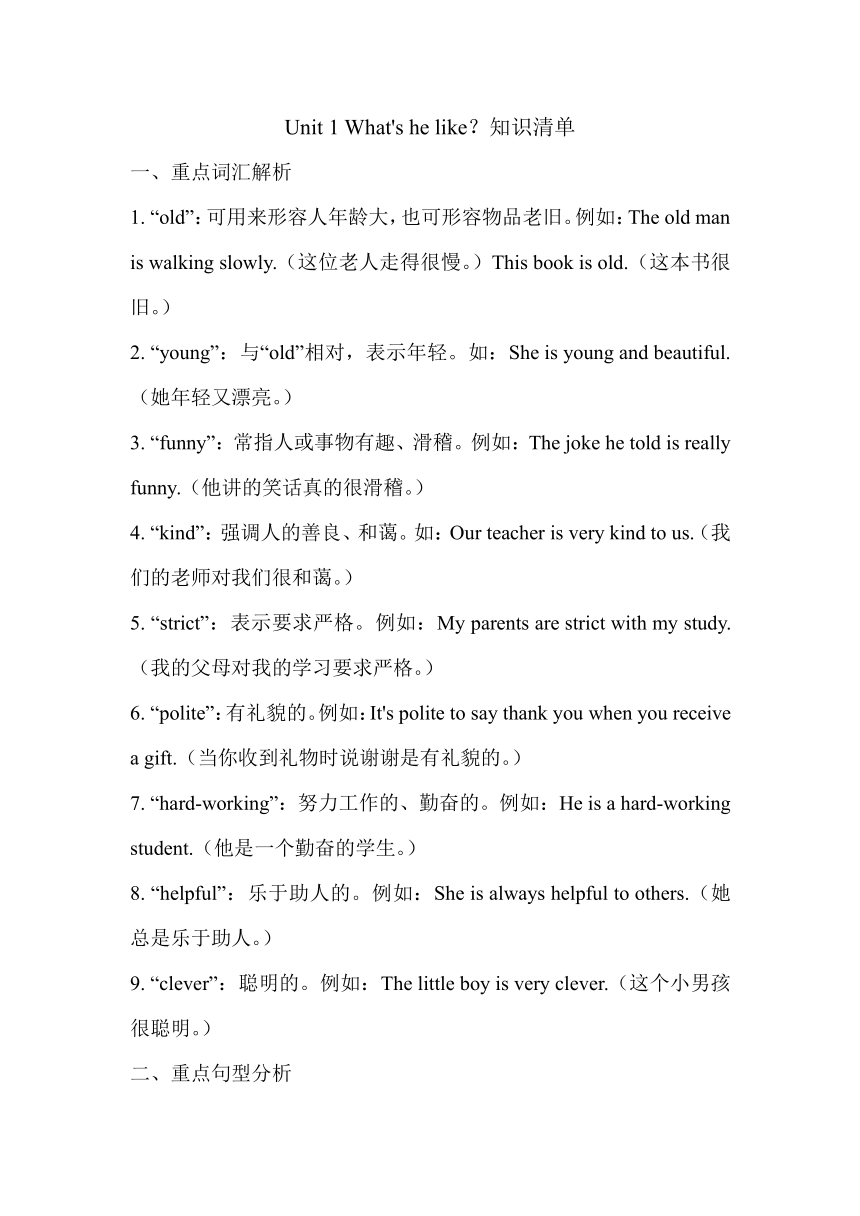Unit 1 What's he like?知识清单
文档属性
| 名称 | Unit 1 What's he like?知识清单 |

|
|
| 格式 | docx | ||
| 文件大小 | 18.1KB | ||
| 资源类型 | 教案 | ||
| 版本资源 | 人教版(PEP) | ||
| 科目 | 英语 | ||
| 更新时间 | 2024-09-21 00:00:00 | ||
图片预览

文档简介
Unit 1 What's he like?知识清单
一、重点词汇解析
1. “old”:可用来形容人年龄大,也可形容物品老旧。例如:The old man is walking slowly.(这位老人走得很慢。)This book is old.(这本书很旧。)
2. “young”:与“old”相对,表示年轻。如:She is young and beautiful.(她年轻又漂亮。)
3. “funny”:常指人或事物有趣、滑稽。例如:The joke he told is really funny.(他讲的笑话真的很滑稽。)
4. “kind”:强调人的善良、和蔼。如:Our teacher is very kind to us.(我们的老师对我们很和蔼。)
5. “strict”:表示要求严格。例如:My parents are strict with my study.(我的父母对我的学习要求严格。)
6. “polite”:有礼貌的。例如:It's polite to say thank you when you receive a gift.(当你收到礼物时说谢谢是有礼貌的。)
7. “hard-working”:努力工作的、勤奋的。例如:He is a hard-working student.(他是一个勤奋的学生。)
8. “helpful”:乐于助人的。例如:She is always helpful to others.(她总是乐于助人。)
9. “clever”:聪明的。例如:The little boy is very clever.(这个小男孩很聪明。)
二、重点句型分析
1. “What's he/she like ”:这是询问某人性格、品质等特征的常用句型。回答可以用上述的形容词来描述。例如:—What's your mother like —She is kind and hard-working.(—你的妈妈什么样?—她既善良又勤奋。)
2. “Is he/she strict ”:这是询问某人是否严格的一般疑问句。回答用“Yes, he/she is.”或“No, he/she isn't.”。例如:—Is your teacher strict —Yes, he is.(—你的老师严格吗?—是的,他严格。)
三、语法要点
1. be 动词(am/is/are)的用法:根据不同的人称和单复数来选择使用。I 后用 am,he/she/it 以及单数名词后用 is,you/we/they 以及复数名词后用 are。例如:I am happy. He is tall. They are students.
2. 形容词的用法:用来描述人或事物的特征。可以放在 be 动词之后作表语,也可以放在名词之前作定语。例如:The man is kind.(表语)The kind woman helps others.(定语)
四、拓展知识
1. 可以通过描述人物的外貌、兴趣爱好等来进一步丰富对人物的描述。例如:He is tall and thin. He likes reading books.(他又高又瘦。他喜欢读书。)
2. 学习用英语描述不同职业的人的特点,如:A doctor is usually kind and patient.(医生通常很和蔼且有耐心。)A policeman is brave and strict.(警察勇敢且严格。)
重点单词造句:
1. “old”:My grandfather is very old, but he is still in good spirits.(我的爷爷年纪很大了,但他仍然精神很好。)
2. “young”:She looks very young although she is already a mother.(她虽然已经是一位母亲了,但看起来很年轻。)
3. “funny”:The clown at the circus is extremely funny and makes everyone laugh.(马戏团的小丑非常滑稽,让每个人都大笑起来。)
4. “kind”:The teacher is very kind to all the students and helps them whenever they need.(这位老师对所有的学生都很和蔼,在他们需要的时候总是帮助他们。)
5. “strict”:My math teacher is very strict, but we know it's for our own good.(我的数学老师很严格,但我们知道这是为了我们好。)
6. “polite”:He is always polite and says “please” and “thank you” often.(他总是很有礼貌,经常说“请”和“谢谢”。)
7. “hard-working”:She is a hard-working student and always gets good grades.(她是一个勤奋的学生,总是取得好成绩。)
8. “helpful”:My neighbor is very helpful and always lends a hand when I need it.(我的邻居非常乐于助人,当我需要的时候总是伸出援手。)
9. “clever”:The little boy is very clever and can solve many difficult problems.(这个小男孩很聪明,能解决很多难题。)
一、重点词汇解析
1. “old”:可用来形容人年龄大,也可形容物品老旧。例如:The old man is walking slowly.(这位老人走得很慢。)This book is old.(这本书很旧。)
2. “young”:与“old”相对,表示年轻。如:She is young and beautiful.(她年轻又漂亮。)
3. “funny”:常指人或事物有趣、滑稽。例如:The joke he told is really funny.(他讲的笑话真的很滑稽。)
4. “kind”:强调人的善良、和蔼。如:Our teacher is very kind to us.(我们的老师对我们很和蔼。)
5. “strict”:表示要求严格。例如:My parents are strict with my study.(我的父母对我的学习要求严格。)
6. “polite”:有礼貌的。例如:It's polite to say thank you when you receive a gift.(当你收到礼物时说谢谢是有礼貌的。)
7. “hard-working”:努力工作的、勤奋的。例如:He is a hard-working student.(他是一个勤奋的学生。)
8. “helpful”:乐于助人的。例如:She is always helpful to others.(她总是乐于助人。)
9. “clever”:聪明的。例如:The little boy is very clever.(这个小男孩很聪明。)
二、重点句型分析
1. “What's he/she like ”:这是询问某人性格、品质等特征的常用句型。回答可以用上述的形容词来描述。例如:—What's your mother like —She is kind and hard-working.(—你的妈妈什么样?—她既善良又勤奋。)
2. “Is he/she strict ”:这是询问某人是否严格的一般疑问句。回答用“Yes, he/she is.”或“No, he/she isn't.”。例如:—Is your teacher strict —Yes, he is.(—你的老师严格吗?—是的,他严格。)
三、语法要点
1. be 动词(am/is/are)的用法:根据不同的人称和单复数来选择使用。I 后用 am,he/she/it 以及单数名词后用 is,you/we/they 以及复数名词后用 are。例如:I am happy. He is tall. They are students.
2. 形容词的用法:用来描述人或事物的特征。可以放在 be 动词之后作表语,也可以放在名词之前作定语。例如:The man is kind.(表语)The kind woman helps others.(定语)
四、拓展知识
1. 可以通过描述人物的外貌、兴趣爱好等来进一步丰富对人物的描述。例如:He is tall and thin. He likes reading books.(他又高又瘦。他喜欢读书。)
2. 学习用英语描述不同职业的人的特点,如:A doctor is usually kind and patient.(医生通常很和蔼且有耐心。)A policeman is brave and strict.(警察勇敢且严格。)
重点单词造句:
1. “old”:My grandfather is very old, but he is still in good spirits.(我的爷爷年纪很大了,但他仍然精神很好。)
2. “young”:She looks very young although she is already a mother.(她虽然已经是一位母亲了,但看起来很年轻。)
3. “funny”:The clown at the circus is extremely funny and makes everyone laugh.(马戏团的小丑非常滑稽,让每个人都大笑起来。)
4. “kind”:The teacher is very kind to all the students and helps them whenever they need.(这位老师对所有的学生都很和蔼,在他们需要的时候总是帮助他们。)
5. “strict”:My math teacher is very strict, but we know it's for our own good.(我的数学老师很严格,但我们知道这是为了我们好。)
6. “polite”:He is always polite and says “please” and “thank you” often.(他总是很有礼貌,经常说“请”和“谢谢”。)
7. “hard-working”:She is a hard-working student and always gets good grades.(她是一个勤奋的学生,总是取得好成绩。)
8. “helpful”:My neighbor is very helpful and always lends a hand when I need it.(我的邻居非常乐于助人,当我需要的时候总是伸出援手。)
9. “clever”:The little boy is very clever and can solve many difficult problems.(这个小男孩很聪明,能解决很多难题。)
